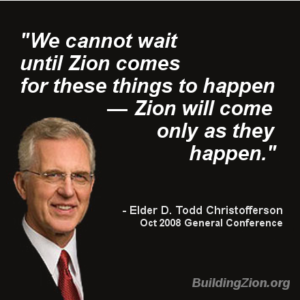For those who aren’t Mormon…
The LDS definition of Zion may seem a little… different to those not acquainted with the teachings of the LDS Church. When members of the Church of Jesus Christ of Latter-Day Saints (“Mormons”) use the word “Zion” they are often referring to the ideal society God wants us to enjoy while here on Earth. That society is marked by peace and prosperity for all. A society where the people happily take on the responsibility for caring for the poor, the sick, and the widows and orphans among their neighbors.
Early records of Zion societies
The ancient prophet Enoch, briefly mentioned in Genesis, Chapter 5, built what we LDS refer to as The City of Enoch. In additional scripture revealed by Joseph Smith, we learn about Enoch’s city and where it went. Over the process of time was “taken up into Heaven” because of the righteousness of the people. (see Moses 7:12-21, 59-64). The apocryphal Book of Enoch mentions a “city of the righteous” — perhaps those two are one and the same.
In the Book of Mormon at least two instances are recorded of a Zion society flourishing. The most detailed is recorded in 4th Nephi of that book. After his resurrection, Jesus Christ visited the people and helped them establish an ideal society. The people enjoyed peace and prosperity as had never been known among them.
Mormon scripture also clarifies that at least one Zion society will be in operation when Jesus returns to begin his millennial reign of peace. In Moses 7:62 the Lord states, “…and righteousness and truth will I cause to sweep the earth as with a flood, to gather out mine elect from the four quarters of the earth, unto a place which I shall prepare, an Holy City, that my people may gird up their loins, and be looking forth for the time of my coming; for there shall be my tabernacle, and it shall be called Zion, a New Jerusalem.”
“Zionists?”
When we use the term “Zion”, Mormons are not referring to the colonization of Palestine by the Jews. So Mormons are not “zionists” in that they do not work for the establishment of a Jewish State in Palestine. However, they do acknowledge that such a state is a likely fulfillment of the prophecy that the Jews would return to Jerusalem.
For Those Who Are LDS
In my discussions online about the concept of Zion, I have discovered that many LDS have in their minds a definition which seems to be rather dis-empowering. Many understand “Zion” to only refer to The New Jerusalem society to be built by the Saints under the direction of Priesthood Keys. So, when I talk about how we can build Zion, they get nervous. They assume I’m suggesting yet another splinter group. Nothing could be further from the truth.
By that limited LDS definition of Zion, it’s no wonder most Saints are waiting around for Jesus to show up and tell us how to build THE Zion. That particular LDS definition of Zion causes us to be passive in fulfilling our covenant to establish Zion. We mistakenly wait to be commanded in all things Zion.
God’s definition of Zion
In contrast, God’s definition of Zion in the scriptures is much broader and more empowering. Christ taught that Zion has basically three elements:
- The people are of “one heart, and one mind”
- There are no poor among them, and
- They dwell in righteousness.
 That definition says nothing about priesthood keys. There have been communities and whole societies that qualify under this definition that were not set up by a prophet of the Church. Ladakh, India, for example, lived these principles for hundreds of years, until very recently. Closer to home, the city of Helam in the Book of Mormon was called “Zion” by Apostle D. Todd Christopherson. Yet Alma, Helam’s builder, was just a newly-repentant former wicked priest of King Noah. Alma was yet to become the official prophet of the Church.
That definition says nothing about priesthood keys. There have been communities and whole societies that qualify under this definition that were not set up by a prophet of the Church. Ladakh, India, for example, lived these principles for hundreds of years, until very recently. Closer to home, the city of Helam in the Book of Mormon was called “Zion” by Apostle D. Todd Christopherson. Yet Alma, Helam’s builder, was just a newly-repentant former wicked priest of King Noah. Alma was yet to become the official prophet of the Church.
Maybe we could use the Lord’s definition of a Zion society, instead of our current Mormon culture’s misperception of it. That way we may see that we can build Zion anytime we want, as Brigham Young taught, no waiting required.